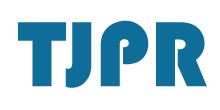
African Journals Online
|
|
||
|
||
|
|
||
|
||
|
e-mail
Alert |
||
|
Research Article
Antimicrobial effects of Indian medicinal plants against acne-inducing bacteria
GS Kumar1*, KN Jayaveera2, CK Ashok Kumar3, Umachigi P Sanjay4, BM Vrushabendra Swamy5, DV Kishore Kumar6.
1Department of Chemistry (K.N.J) Jawaharlal Nehru Technological University College of Engineering, Ananthpur- 01, Andhra Pradesh, India. 2Department of Pharmacognosy (G.S.K), 3Department of Pharmaceutics (U.P.S), 4Department of Pharmacology (B.M.V.S), 5Department of Chemistry (D.V K.K), Rural College of Pharmacy, D.S.Road, Devanahalli-562110 Karnataka, India. 6Department of Pharmacognosy (A.K.C.K) Sree Vidyanikethan, College of Pharmacy, A.Rangamepeta, Chittoor Dist, Andhra Pradesh, India.
Tropical Journal of Pharmaceutical Research 2007; 6(2): 717-723
ISSN: 1596-599
Abstract
Propionibacterium acnes and Staphylococcus epidermidis have been recognized as pus-forming bacteria triggering an inflammation in acne. The present study was conducted to evaluate antimicrobial activities of Indian medicinal plants against these etiologic agents of acne vulgaris. Ethanolic extracts of Hemidesmus indicus (roots), Eclipta alba (fruits), Coscinium fenestratum (stems), Curcubito pepo (seeds), Tephrosia purpurea (roots), Mentha piperita (leaves), Pongamia pinnata (seeds), Symplocos racemosa (barks), Euphorbia hirta (roots), Tinospora cordyfolia (roots), Thespesia populnea (roots), and Jasminum officinale (flowers) were tested for antimicrobial activities by disc diffusion and broth dilution methods. The results from the disc diffusion method showed that 07 medicinal plants could inhibit the growth of Propionibacterium acnes. Among those Hemidesmus indicus, Coscinium fenestratum, Tephrosia purpurea, Euphorbia hirta, Symplocos racemosa, Curcubito pepo and Eclipta alba had strong inhibitory effects. Based on a broth dilution method, the Coscinium fenestratum extract had the greatest antimicrobial effect. The MIC values were the same (0.049 mg/ml) for both bacterial species and the MBC values were 0.049 and 0.165 mg/ml against Propionibacterium acnes and Staphylococcus epidermidis, respectively. In bioautography assay, the Coscinium fenestratum extract produced strong inhibition zones against Propionibacterium acnes. Phytochemical screening of Coscinium fenestratum revealed the presence of alkaloid which could be responsible for activity. Taken together, our data indicated that Coscinium fenestratum had a strong inhibitory effect on Propionibacterium acnes and Staphylococcus epidermidis.
Keywords:
Acne; Propionibacterium acnes; Staphylococcus epidermidis;
Antimicrobial activity
*Correspondence: E-mail: pharmacygsk@rediff.com, kumar_cog@yahoo.com